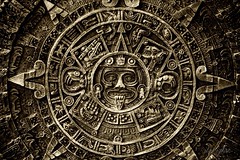 Over at Tor.com, Mary Pearson (The Kiss of Deception) discusses how a childhood history report made its way into her latest novel. Excerpts:
Over at Tor.com, Mary Pearson (The Kiss of Deception) discusses how a childhood history report made its way into her latest novel. Excerpts:It's been a long time since I did that report and I can't remember every detail about the Mayans, but I do remember one thing: my research couldn't tell me what happened to them. It was a mystery which delighted my ten year-old self. It seemed that they had simply vanished off the face of the earth. There were even delicious musings that the Mayans had been aliens, and beamed up to their mother ship because they were done with Earth. An advanced civilization, pfft. Gone. ...Read the whole thing. Lots of authors use history as a springboard into imagined worlds, from George R.R. Martin's tapping of The War of the Roses to Jeff VanderMeer's sampling of the tasty bits from Byzantium. It's a tradition with a venerable history. But it's not the only way to reel in inspiration. Science, philosophy, economics, theology -- almost every discipline can serve as a hook upon which to hang you narrative hat. Literary author Larry Woiwode once wrote that memory is a magpie, always going after the shiniest things. He meant that as a caution to memoirists, but it can serve as inspiration for genre scribes. The world is full of bright things for you to write about; all you need to do is find them.
It wouldn't be the first time such a mystery went unsolved. We are still discovering ancient civilizations that we had no clue about. Advanced, established civilizations. And so with that little nugget of mystery in mind, I embarked on creating the world of The Remnant Chronicles, a civilization that has sprung from the ashes of another—and a kingdom with only some vague, uninformed understanding of just what that civilization was.
Though my story does have ferns and vines reclaiming ancient ruins for the earth, much like the jungle hid many Mayan ruins, that's where similarities end. This bit of history is a springboard for the world I built and the people who inhabit it, but The Remnant Chronicles didn't come out of thin air. It has precedent as many fantasy settings do -- an author takes bits of a real world and real history and they make it their own.
(Picture: CC 2011 by Kim Alaniz)


No comments:
Post a Comment